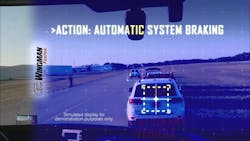Study: Driver assistance technology could prevent 28% of crashes
Broader adoption of advanced driver assistance systems (ADAS) such as forward collision warning, adaptive cruise control, blind spot detection, lane departure warning, and self-parking systems could prevent 28% of all crashes in the U.S., according to a new study from The Boston Consulting Group (BCG) – preventing some 9,900 fatalities annually and saving about $251 billion each year.
The study, entitled A Roadmap to Safer Driving Through Advanced Driver Assistance Systems and commissioned by the Motor & Equipment Manufacturers Association (MEMA), also noted that roughly 33,000 people are killed in the U.S. every year in vehicle crashes; incidents that also cause 3.9 million injuries and damage 24 million vehicles, according to government estimates, with a “cost to society” of about $910 billion annually, equivalent to roughly 6% of U.S. gross domestic product (GDP).
"Because the vast majority of crashes in the United States are caused by driver error, the lack of adoption of these technologies within the U.S. fleet is a significant missed opportunity," noted Xavier Mosquet, head of BCG's automotive practice and a co-author of the study, in a statement.
"This is especially true considering that ADAS technologies also pave the way for partially and fully autonomous vehicles, which could further reduce crashes—and their cost to society—by 90% or more," he added.
Yet despite those potential safety benefits and cost savings, Mosquet pointed out that relatively few vehicles on the road today feature ADAS technologies, with market penetration only growing at only 2% to 5% annually.
BCG’s research indicated that one reason consumers are slow to adopt ADAS features is the cost of such systems.
For example, according to a recent consumer survey, most car owners said they would be willing to pay $100 to $400 for blind spot detection – yet the current price tag for that system, BCG said, is around $595 per vehicle.
In another example, surround-view camera systems – which first became available in 2010 – are only installed in 1% of new vehicles today and should only increase to 3% by 2020, BCG noted. Though the average cost for surround-view packages is expected to fall during that five-year timeframe, from $900 per vehicle to $660, the average consumer is only willing to pay $390, according to the firm’s research.
"The innovations being created and developed by suppliers to light vehicle and heavy-duty truck manufacturers present a golden opportunity to dramatically improve vehicle safety and save lives," emphasized Michelle Andersen, a BCG partner and the other co-author of the report, in a statement.
"Compared with Europe and Japan, however, the U.S. market has made less progress on the adoption front, and much work remains to be done," she stressed.
About the Author
Sean Kilcarr
Editor in Chief
Sean Kilcarr is a former longtime FleetOwner senior editor who wrote for the publication from 2000 to 2018. He served as editor-in-chief from 2017 to 2018.
